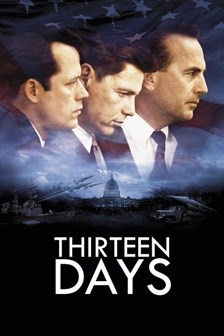THIRTEEN DAYS

«What kind of peace do we seek?
I am talking about genuine peace, the kind of peace that makes life on earth worth living.
Not merely peace in our time but peace for all time.
Our problems are manmade--therefore, they can be solved by man.
For, in the final analysis,
our most basic common link is that we all inhabit this small planet.
We all breathe the same air.
We all cherish our children's future.
And we are all mortal».
Original quote from John Fitzgerald Kennedy’s speech at the American University of Washington DC (10th June 1963), taken from the movie Thirteen Days by Roger Donaldson.
The (trade) peace seems close. If in Thirteen Days John F. Kennedy had to answer to the Soviet Union regarding the Cuban missile crisis, today's president of the United States, Donald Trump, has to face Xi Jinping's China, and the missiles have a new name: tariffs. Perhaps even today, among the corridors of the White House wanders a Kenny O'Donnel, the official played by Kevin Costner who unstintingly commits to finding a peaceful solution. Of course we know that the negotiations between the two superpowers are one step away from the finish line. The United States could, in fact, withdraw the tariffs imposed on over 200 billion dollars of Chinese goods. Beijing, instead, could lower tariffs on many USA’s products in the agricultural, chemical and automotive sectors; the Asian dragon would even be willing to significantly increase the imports of American gas. A formal signing of the agreement may soon take place, during a summit that will be held on March 27, but until then it is better not to take anything for granted, partly because during his presidency Trump has given us many twists and turns. Who knows if USA and China have really understood that " we all inhabit this small planet".
Optimism about the trade war has pushed up the Asian exchange list: on Monday, Shanghai closed at + 1.12%, while Tokyo at + 1.06%. But trust also fell on crude oil and the price of black gold rose again. The fewer extractions of the OPEC countries and the involuntary cut of the Venezuelan production have also influenced the increase (in the South American nation the tension remains very high). According to Fitch Solutions analysts, Brent is expected to average $ 73 per barrel in 2019.
Besides the negotiations between Washington and Beijing, investors have their eyes on the Chinese Communist Party Congress, which opens in the next few days. During the event the goals of GDP growth for 2019 will be announced (forecasts speak of + 6%), as well as the economic and social plan, that foresees possible incentives and investments in infrastructures.
Back to the States, an internal matter should not be underestimated. There seems to be no peace between the White House and the Federal Reserve, with Trump attacking, again, the president of the central institute Jerome Powell:«We have a gentleman that likes a very strong dollar in the Fed. I want a strong dollar but not a dollar that’s so strong that it makes it prohibitive for us to do business with other nations». In essence, the American president fears that a too high a value of money may damage exports, thus increasing the trade imbalances so feared by the tycoon.
Will Europe find peace? There are many knots to untie, starting from the Brexit. There are signs of hope for a green light to the new plan that Prime Minister Theresa May has committed to submit to the British Parliament by March 12. Some rebel hawks of the majority have in fact declared that they are willing to compromise. But we must act fast, because if by the end of the month we will not see any progress, we’ll risk the exit of the United Kingdom from the European Union without any agreement.
As for monetary policy, in the Old Continent Thursday’s ECB meeting, followed by the usual press conference of Governor Mario Draghi, raises some expectation. The central bank will provide more information on the next steps. And the hypothesis of keeping interest rates at a very low level even after next summer is not excluded. The Institute will also announce the new economic estimates, with a possible cut in growth forecasts in the Eurozone. But under the markets’ magnifying glass there will also be the statements about the TLTRO, a complicated acronym that indicates the auctions that aim to provide low-cost liquidity to banks in order to support the consumption and investment of companies. The launch of a new refinancing plan is highly probable, and the institutes are ready to uncork the Champagne; in particular the Italian banks, the main beneficiaries of the previous Tltro, interrupted in 2016.
Not only ECB: according to Bloomberg, international investors will also focus on monetary policy meetings of the Reserve Bank of Australia and the Bank of Canada. Thus, this opens up a period of important decisions, with the hope that decision makers will remember that «we are all mortal».
